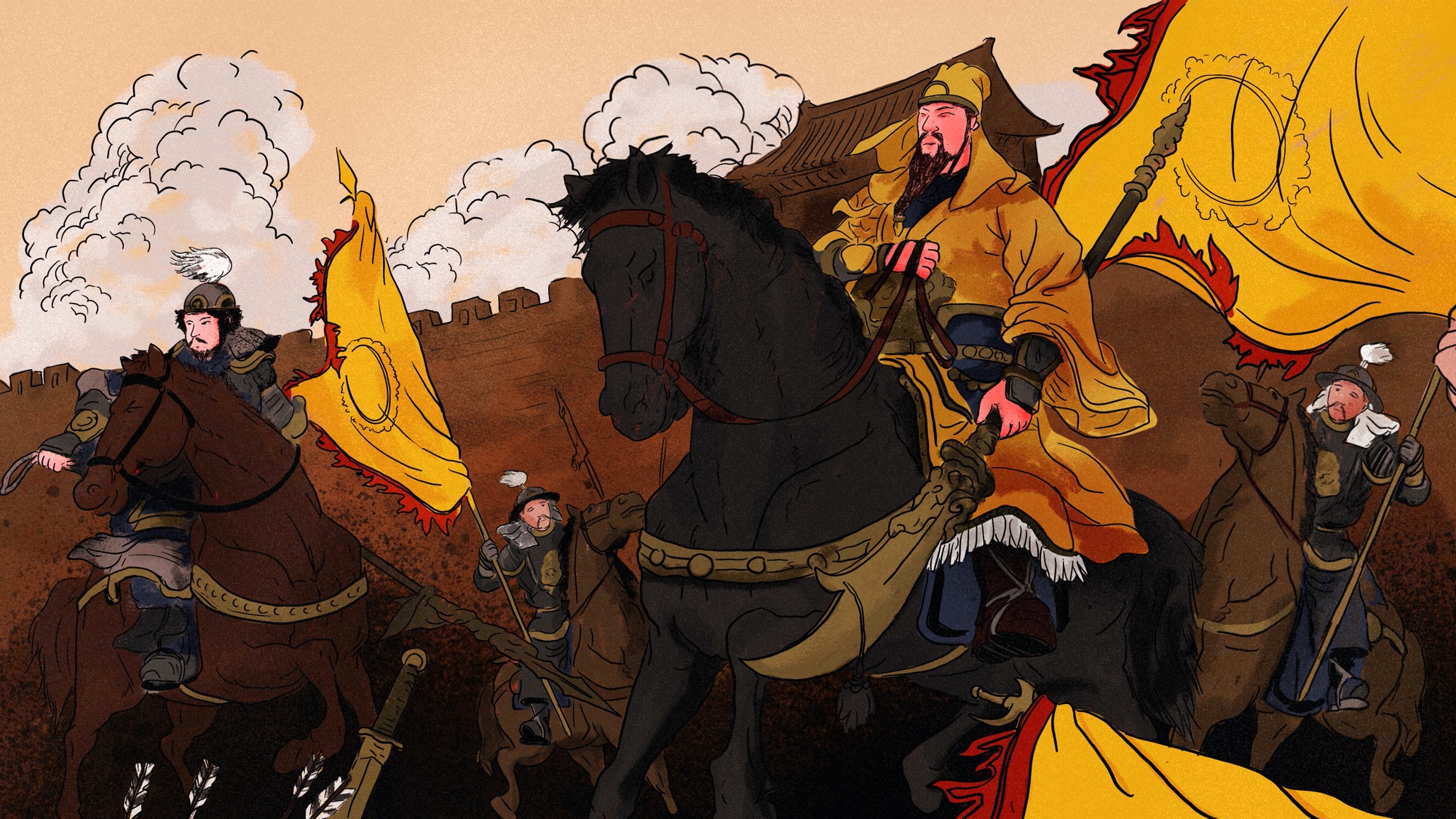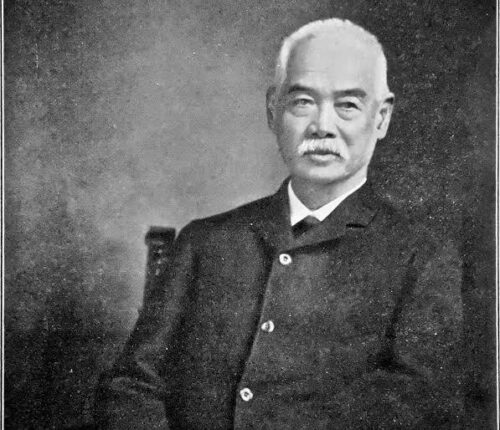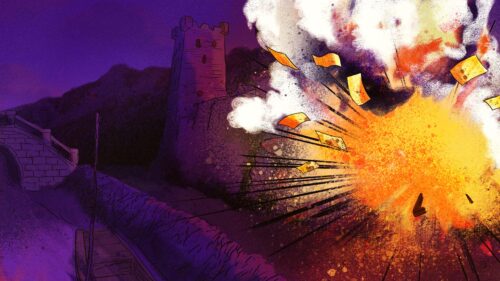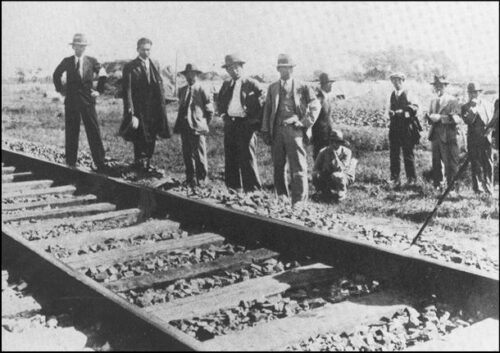This Week in China’s History: July 10, 1519
Betrayal, intrigue, siblings pitted against one another for the right to rule, suggestions of illegitimacy, war, bribery, a patriarch of questionable competence…
HBO prestige drama? Shakespearean tragedy? Both fit the bill, but This Week in China’s History looks not to Westeros or Waystar-Royco, nor to England during the Wars of the Roses, but instead to the other end of the Eurasian landmass, a few decades after Lancaster and York fought for the English throne.
Zhū Chénháo 朱宸濠 was the fifth generation to hold the title Prince of Ning. The title had originated with the dynasty itself: Zhū Yuánzhāng 朱元璋 — a.k.a. Ming Taizu, the Hongwu Emperor, founder of the Ming dynasty — established fiefdoms for his sons (all 26 of them!) and installed them with salaries and armies. Strategically placed around the empire, these princes provided defense against foreign invasion, and might — theoretically, anyway — provide loyal troops to ensure the emperor’s power. Yet even in Taizu’s own lifetime, the princes proved to be — in an apt instance of an overused metaphor — a double-edged sword. They had titles, troops, and treasure: enough to pose threats to nervous emperors. As historian John Dardess observed in his “concise history of a resilient empire,” Taizu wouldn’t even permit the princes to gather at the capital for his funeral, lest they unite to usurp the throne.
(And his fears were well founded — a civil war centered on the Ming princes led to the death of Taizu’s chosen successor, the destruction of the Ming palace, and the relocation of the capital from Nanjing to Beijing…but that is not today’s topic.)
The princes (confusingly, what is here rendered in English as “prince” is the character 王 wáng, which any first-year Chinese student knows is usually translated as “king”) remained potential thorns in imperial sides, although after the war of succession following Taizu’s death, their power tended to diminish. Each of Taizu’s successors worked to eliminate the princes that the founder had established — while installing a few of their own — with mixed results. For roughly a century, the princes and the emperor coexisted.
That changed when the 13-year-old Zhèngdé 正德帝 ascended to the throne in 1505. Described by Dardess as “an utter madcap,” Zhengde paid little attention to rules and norms, or even to governing. His negligence and misrule led to one rebellion, in 1510, and although that was quickly put down, the emperor’s persistent incompetence encouraged other challengers.
The Prince of Ning was one of those established in the early years of the Ming; the first prince, Zhū Quán 朱权, was the 17th son of Ming Taizu, and had been rewarded for his exemplary military service with a strategically vital fiefdom based in Daning, near the Mongolian frontier. The princedom had eventually lost its military power and was relocated to Jiangxi in southeastern China by the third Ming emperor, Yongle, but the fifth-generation prince, Zhu Chenhao, had designs on the throne. As early as 1507, he had begun bribing imperial officials to acquire soldiers and influence.
Aside from alcoholism, corruption, and indifference to governing, the Zhengde emperor was vulnerable because he had no heir. The Prince of Ning could promise not only royal blood, but also a clear line of succession to his own son. Accruing allies at court and an army in Jiangxi, the prince began behaving more and more autonomously: expropriating property, recruiting a private army, and confounding government attempts to exercise authority in his domain. On at least one occasion, according to the Cambridge history of the Ming dynasty, he commanded regional officials to attend him in a formal audience — wearing court robes — in a clear imitation of the imperial court itself. Officials in Beijing granted his requests for imperial seals that gave him power over regional officials and troops. Rumors of sedition came before the emperor regularly, but any time alarms were raised about the irregular activities of the prince — and officials consistently attempted to charge the prince with treason — his allies in the capital managed to quash them.
Only in the summer of 1519 was Zhengde persuaded that the prince’s activities demanded closer scrutiny. Years of allegations, documents, and charges painted the picture of an uprising, and the emperor finally agreed to send officials to Nanchang, the prince’s capital, to investigate.
The prince’s spies brought word of his impending arrest at his birthday party. If he was to rebel, now was the time.
The next morning, July 10, 1519, Zhu openly proclaimed his intentions. He declared that Zhengde was not the legitimate heir to the throne but was instead a usurper: a commoner who had been falsely put forward as the emperor’s son by a corrupt eunuch. Moreover, he implied the empress was aware of the usurpation and had issued an edict to the prince ordering him to punish the pretender. When the governor of Jiangxi asked to see this edict and was denied, he accused the prince of treason — and was executed on the spot. Anyone else who questioned the prince’s cause or his plans was promised a similar fate.
Now at the head of an open rebellion, the Prince of Ning mobilized his army to march toward Nanjing — planning to then proceed to Beijing — and captured several cities before reaching the Yangtze port of Anqing.
In Anqing, though, Zhu Chenhao’s fortunes turned. The city fought off the rebels’ attack, stymieing their advance. Meanwhile, a counteroffensive was organized by scholar-official Wáng Yángmíng 王陽明 (better known as one of the most important philosophers in Chinese history and one of the principal interpreters of Confucianism). Wang’s troops marched on the prince’s capital, left undefended for the attack on Nanjing, then swept down to destroy the prince’s army, now on boats preparing to sail downriver to Nanjing, and captured the Prince of Ning himself.
The Prince of Ning was a prisoner in Nanjing for more than a year, until the fall of 1520, when the emperor himself, who had traveled to Nanjing as part of a southern tour, took the fallen prince back toward his capital, where the penalty for treason would be carried out: death by slow slicing. The emperor’s entourage proceeded north along the Grand Canal, with the sovereign almost always drunk, as was his custom. On October 25, Zhengde fell overboard while fishing — probably drunk — and never fully recovered. The procession continued slowly north into a grim winter.
On January 13 — still not yet in Beijing — the Prince of Ning was allowed to take his own life rather than endure the indignity of slow slicing. Eight days later — having just arrived back in Beijing — the Zhengde emperor himself died, having never recovered from the accident suffered in October.
Cersei Lannister warned Ned Stark, “When you play the game of thrones, you win or you die.” The Prince of Ning’s rebellion showed that even the winners were not guaranteed to survive.
This Week in China’s History is a weekly column.






